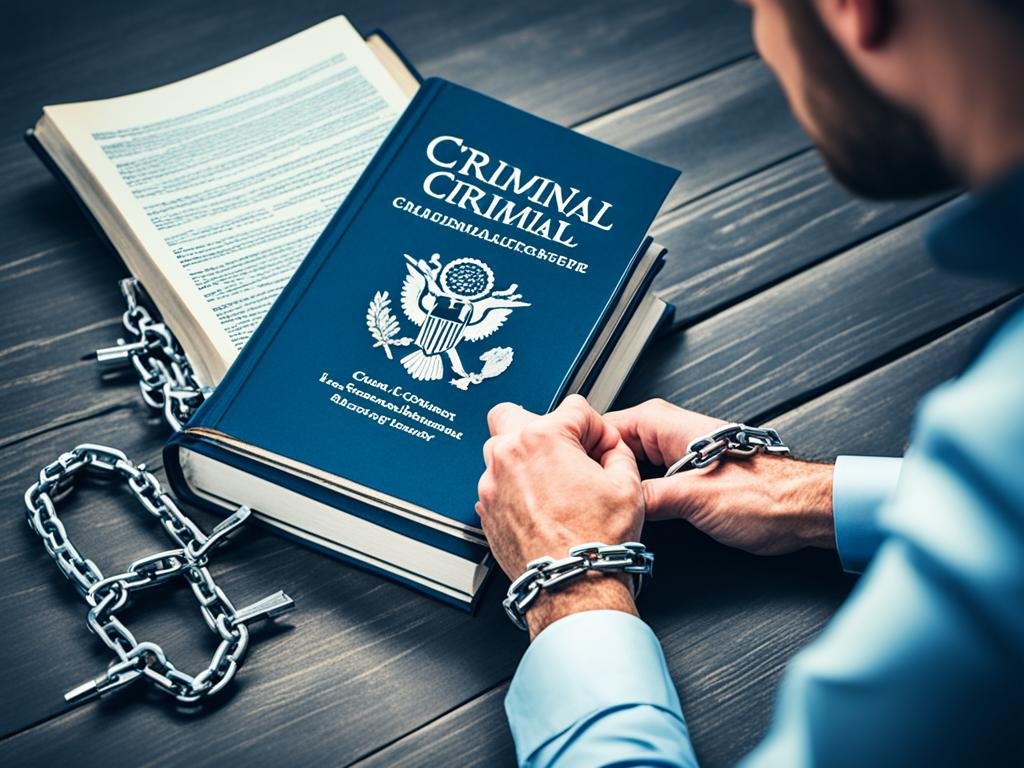As an individual accused in a criminal case, it is crucial to understand and assert your legal rights. The criminal justice system can be complex and intimidating, but arming yourself with knowledge about your rights can make a significant difference in the outcome of your case. In this comprehensive guide, I will provide valuable insights and guidance on how to navigate the legal landscape when facing criminal charges.
From understanding the basis of your legal rights to knowing what to do during the arrest process, this guide will equip you with the necessary information to protect your interests. I will delve into topics such as the importance of the Bill of Rights, the distinction between state and federal rights, and the significance of Miranda rights during interrogations.
Additionally, I will highlight the crucial role of a criminal defense attorney in ensuring your rights are upheld and provide guidance on selecting competent legal representation. We will also explore pre-trial rights, the role of the Confrontation Clause in confronting evidence, and the importance of digital privacy in the face of search and seizure laws.
By asserting your rights and seeking professional legal advice, you can strengthen your defense and navigate the criminal justice system more effectively. Remember, being accused of a crime doesn’t mean you lose your rights. It is essential to exercise those rights throughout the legal process to ensure a fair and just outcome.
Keep reading to gain a deeper understanding of your legal rights as an accused individual in a criminal case.
Key Takeaways:
- Understanding and asserting your legal rights is crucial when facing criminal charges.
- The Bill of Rights and amendments impact the legal protections provided in criminal cases.
- Knowing your rights during the arrest process is vital, including warrantless arrests and probable cause.
- Seeking legal counsel from a competent criminal defense attorney is essential for a strong defense.
- Miranda rights and the right to remain silent play a significant role during interrogations.
Understanding the Basis of Your Legal Rights in Criminal Cases
In order to navigate the complex world of criminal proceedings, it is crucial to have a solid understanding of your legal rights. These rights serve as a cornerstone of the criminal justice system, ensuring that individuals are granted fair and just treatment throughout the course of their case.
The Bill of Rights and Criminal Proceedings
The Bill of Rights, the first ten amendments to the United States Constitution, establishes fundamental legal protections for individuals involved in criminal cases. These amendments guarantee various rights, such as the right to due process, protection against unreasonable searches and seizures, and the right to a fair trial.
The Bill of Rights acts as a safeguard against potential abuses of power, ensuring that individuals are granted specific legal rights that must be respected by law enforcement and the judicial system.
Understanding the specific rights outlined in the Bill of Rights is crucial for anyone involved in a criminal case. It provides the framework for legal protections and serves as a guide to assert and protect your rights throughout the criminal proceedings.
Amendments Impacting Your Legal Protections
In addition to the Bill of Rights, several key amendments have been added to the Constitution that further impact legal protections in criminal cases. These amendments have evolved over time to adapt to the changing landscape of criminal justice.
For example, the Fourth Amendment guarantees protection against unreasonable searches and seizures, requiring law enforcement to obtain a warrant supported by probable cause before conducting searches or seizing evidence. The Fifth Amendment includes the right to remain silent and protection against self-incrimination. The Sixth Amendment ensures the right to a speedy and public trial with an impartial jury.
Furthermore, the Eighth Amendment prohibits cruel and unusual punishment, ensuring that individuals are not subjected to excessive bail or fines and are protected from cruel or degrading treatment.
State vs. Federal Rights in Criminal Cases
When it comes to legal rights in criminal cases, it is important to understand the distinction between state and federal rights. The United States’ legal system is structured with both federal and state jurisdictions, each with its own set of laws and legal protections.
While some legal rights are protected at the federal level by the United States Constitution, individual states may have additional rights or variations on existing rights. It is essential for individuals to familiarize themselves with the specific rights and legal protections granted in their respective jurisdictions.
Understanding the interplay between state and federal rights is crucial for individuals involved in criminal cases, as it ensures that they are fully aware of the legal landscape in which their case will be heard.
By comprehending the basis of your legal rights in criminal cases, including the influence of the Bill of Rights, the impact of amendments on legal protections, and the distinction between state and federal rights, you can effectively exercise and protect your rights throughout the criminal proceedings.
| Bill of Rights | Amendments Impacting Legal Protections | State vs. Federal Rights |
|---|---|---|
| Establishes fundamental legal protections | Evolved to adapt to changing criminal justice landscape | Differences in legal rights between federal and state jurisdictions |
| Guarantees rights such as due process and fair trial | Fourth Amendment: Protection against unreasonable searches and seizures | Individual states may have additional rights |
| Serves as a safeguard against power abuse | Fifth Amendment: Right to remain silent and protection against self-incrimination | Important to be familiar with specific rights in respective jurisdictions |
| Sixth Amendment: Right to a speedy and public trial | ||
| Eighth Amendment: Protection against cruel and unusual punishment |
The Arrest Process and Your Rights
When you find yourself facing an arrest, it’s crucial to understand the arrest process and your rights during this challenging time. This section will provide valuable information on warrantless arrests, probable cause, and important guidelines to follow if you’re arrested without a warrant.
Warrantless Arrests and Probable Cause
In some situations, law enforcement officers may make an arrest without obtaining a warrant beforehand. This can occur if there is probable cause to believe that a crime has been committed, and the person being arrested is involved in the offense.
Probable cause is a legal standard that requires law enforcement to have reasonable grounds to believe that a crime has occurred and that the individual being arrested is connected to that crime. It is essential to note that probable cause is necessary to justify a warrantless arrest and protect individuals’ rights during the arrest process.
During a warrantless arrest based on probable cause, law enforcement officers are permitted to take the individual into custody and present them before a judge or magistrate within a reasonable time to determine if the arrest was lawful.
What To Do If You’re Arrested Without a Warrant
If you find yourself being arrested without a warrant, it’s crucial to remember your rights and take the appropriate steps to protect yourself. Here are some important guidelines to follow:
- Remain calm and cooperate: It’s essential to remain calm and cooperate with law enforcement officers during the arrest process. This can help ensure your safety and prevent any unnecessary escalation of the situation.
- Do not volunteer information: While it’s important to cooperate, it’s equally important not to provide any self-incriminating statements or volunteer any information without first speaking to a qualified attorney. Exercise your right to remain silent and wait until you have legal representation present.
- Request legal representation: As soon as possible, request to speak with an attorney. You have the right to have legal counsel present during any questioning or legal proceedings. A skilled criminal defense attorney can provide guidance, protect your rights, and navigate the legal process on your behalf.
- Document the arrest: If possible, make a mental note or document any details surrounding the arrest, such as the names and badge numbers of the arresting officers, the date and time of the arrest, and any other relevant information. This information may be valuable for your defense.
- Contact a criminal defense attorney: After the arrest, it’s crucial to seek the advice and representation of a qualified criminal defense attorney. They will assess your case, protect your rights, and work diligently to build a strong defense strategy.
Remember, understanding your rights during the arrest process is essential. By staying informed, remaining calm, and seeking professional legal guidance, you can effectively navigate the legal system and protect your rights.

Your Legal Rights in Criminal Cases When Facing Charges
When facing criminal charges, it is crucial to understand and assert your legal rights. Knowing your rights can help protect your interests and ensure a fair legal process. Here are some key rights to keep in mind:
- The right to remain silent: You have the right to refrain from answering any questions from law enforcement without a lawyer present. This is to avoid self-incrimination and protect your legal interests.
- The right to legal representation: You have the right to an attorney at every stage of the criminal proceedings, including interrogations, hearings, and trial. A lawyer can provide you with crucial legal advice and guidance to navigate the complex process.
- The right to a fair trial: You have the right to a speedy and public trial by an impartial jury. This means that the prosecution must present sufficient evidence to prove your guilt beyond a reasonable doubt, and you have the right to challenge their case.
- The right to confront witnesses: The Confrontation Clause of the Sixth Amendment grants you the right to confront and cross-examine witnesses against you. This allows you to challenge their credibility and provide counterarguments.
- The right to be presumed innocent: You are innocent until proven guilty. The burden of proof lies with the prosecution, and they must provide evidence to establish your guilt beyond a reasonable doubt.
Asserting these rights is essential to safeguard your interests and ensure a fair legal process. Seeking legal advice from a knowledgeable criminal defense attorney is crucial in navigating the complexities of the criminal justice system.
Navigating Your Miranda Rights and Interrogations
When it comes to police interrogations, understanding your Miranda rights is crucial. These rights, established in the landmark Supreme Court case Miranda v. Arizona, are designed to protect individuals under custodial interrogation and ensure fairness in the criminal justice system.
Understanding Your Miranda Rights
Miranda rights, also known as the Miranda warning, are a critical safeguard for those facing police questioning. They inform individuals of their right to remain silent and their right to legal representation. Law enforcement officers are required to read these rights to a suspect before conducting a custodial interrogation.
The Miranda warning typically includes the following rights:
- The right to remain silent
- The right to an attorney

The Right to Remain Silent and the Impact on Your Case
One of the key aspects of Miranda rights is the right to remain silent. This means that you have the option to refuse to answer any questions during police interrogations. It is essential to exercise this right, as anything you say can be used against you in a court of law.
Remaining silent can protect you from self-incrimination and potentially damaging statements. It is important to remember that the burden of proof lies with the prosecution, and it is not your obligation to provide evidence of your innocence during an interrogation.
Avoiding Self-Incrimination During Custodial Questioning
During a custodial questioning, it is crucial to avoid self-incrimination. This means that you should refrain from providing any information that could be used against you. Even seemingly innocent statements can be twisted and misconstrued by the prosecution.
It is advisable to invoke your right to remain silent and wait until you have legal representation present before answering any questions. A criminal defense attorney can guide you through the interrogation process, ensuring that your rights are protected and preventing any unintended self-incrimination.
Navigating your Miranda rights and interrogations can be challenging, especially when the pressure is high. Consulting with an experienced criminal defense attorney can provide the guidance and support you need to assert your rights and protect your interests.
Access to Legal Counsel: The Crucial Role of a Criminal Defense Attorney
In a criminal case, having access to competent legal counsel is essential to assert your legal rights and navigate the complexities of the legal system. A skilled criminal defense attorney can provide expert advice, guidance, and representation throughout the entire legal process.
When facing criminal charges, selecting the right legal representation is crucial. The choice between a public defender and a private criminal defense lawyer depends on various factors, including personal circumstances, financial resources, and the complexity of the case.
Selecting Competent Legal Representation
Choosing the right criminal defense attorney is a critical decision that can significantly impact the outcome of your case. Consider the following factors when selecting legal representation:
- Experience and expertise in criminal law
- Track record of success in handling similar cases
- Availability and accessibility
- Communication skills and personal compatibility
- Cost and fee structure
Take the time to research and interview multiple attorneys to find the one who best aligns with your needs and goals.
Public Defender vs. Private Criminal Defense Lawyer
If you cannot afford a private criminal defense lawyer, you may be eligible for a court-appointed public defender. Public defenders are attorneys employed by the government to provide legal representation to individuals who cannot afford private counsel.
While public defenders are dedicated professionals, they often have heavy caseloads, limited time and resources, and may not specialize in specific areas of criminal law. On the other hand, hiring a private criminal defense lawyer allows you to choose an attorney who specializes in your specific type of case and can provide more personalized attention and resources.
Ultimately, the decision between a public defender and a private criminal defense lawyer should be based on a careful evaluation of your unique circumstances and legal needs.
Having a competent criminal defense attorney by your side can make a significant difference in the outcome of your case. They will protect your rights, build a strong defense strategy, and represent your best interests throughout the legal process.
Pre-Trial Rights: Bail, Arraignment, and Preparations for Defense
The pre-trial phase of a criminal case is a critical period where individuals have specific rights that must be understood and upheld. During this stage, several important processes take place, including bail, arraignment, and preparations for the defense. It is essential to navigate these proceedings effectively to ensure the best possible outcome for your case.
One key aspect of the pre-trial phase is bail. Bail refers to the temporary release of an accused individual in exchange for a specified amount of money or collateral. It allows individuals to await their trial outside of jail, provided they adhere to certain conditions and appear in court as required. Bail can be a complex process, and understanding your rights and options is crucial. Talk to your attorney for guidance on securing bail and ensuring compliance with the conditions set by the court.
The next significant step in the pre-trial phase is arraignment. Arraignment is the formal process where an accused individual is brought before the court to hear the charges against them. During this stage, it is important to have legal representation to ensure your rights are protected, and you understand the charges being brought against you. Your attorney will guide you through the arraignment process and advise you on the best course of action to take.
Additionally, adequate preparations for defense are essential during the pre-trial phase. This involves gathering evidence, interviewing witnesses, and formulating a strong defense strategy. Your attorney will work with you to assess the evidence against you, identify any potential legal issues, and develop a defense plan tailored to your specific case. Properly preparing for the defense can significantly impact the outcome of your trial.
Taking advantage of your pre-trial rights, including understanding the bail system, navigating the arraignment process, and preparing for the defense, is crucial to protect your legal interests and ensure a fair trial. Being well-informed and working closely with an experienced criminal defense attorney will give you the best chance at a positive outcome in your case.
Confronting Evidence: The Role of the Confrontation Clause
When facing criminal charges, individuals have the right to confront the evidence presented against them. This right is protected by the Confrontation Clause of the Sixth Amendment, which ensures that the accused has the opportunity to face their accusers in court.
The Confrontation Clause serves as a crucial safeguard in the criminal justice system, preventing the admission of hearsay evidence without proper confrontation. Hearsay evidence refers to statements made outside of the courtroom that are presented as evidence to prove the truth of the matter asserted. Often, hearsay evidence is considered unreliable and lacks the necessary firsthand knowledge and cross-examination to ensure its accuracy.
By granting individuals the right to confront their accusers, the Confrontation Clause promotes fairness and transparency in criminal proceedings. This allows the accused to challenge the credibility and reliability of witnesses and evidence presented against them, providing an opportunity for a robust defense.
However, it’s important to note that there are limitations to hearsay evidence in court. The rules of evidence typically exclude hearsay statements unless they fall within a recognized exception. This ensures that only reliable and trustworthy evidence is presented to the jury or judge, protecting the accused’s right to a fair trial.

Your Right to Face Accusers
The right to face accusers is a fundamental aspect of due process in criminal cases. It allows the accused to observe the demeanor of witnesses, assess their credibility, and challenge their testimony through cross-examination.
By facing their accusers directly, the accused can question the motives and biases of witnesses, uncover inconsistencies in their statements, and present alternative explanations for the events in question. This helps to ensure that the truth is revealed and that wrongful convictions are minimized.
Hearsay Evidence and Its Limitations in Court
Hearsay evidence, as previously mentioned, refers to statements made outside of court that are offered to prove the truth of the matter asserted. While there are exceptions to the hearsay rule, such as statements made under oath or statements made against the declarant’s interest, its use in court is generally limited.
The limitations on hearsay evidence aim to protect the rights of the accused to confront and cross-examine witnesses. These limitations recognize that allowing the admission of hearsay evidence without an opportunity for cross-examination can undermine the fairness and reliability of the trial process.
In summary, the Confrontation Clause ensures that individuals facing criminal charges have the right to confront the evidence presented against them and to face their accusers directly in court. This important protection promotes fairness, transparency, and the integrity of the criminal justice system.
Digital Privacy and Search and Seizure Laws
In today’s digital age, protecting our personal information from unwarranted searches is of paramount importance. The rapid advancement of technology has raised new concerns about digital privacy and the legal rights surrounding the search and seizure of electronic devices. Understanding the laws and regulations governing these matters is crucial for individuals seeking to safeguard their digital information.
Protecting Your Digital Information from Unwarranted Searches
When it comes to digital privacy, it is essential to be aware of your rights and take steps to protect your information. The Fourth Amendment of the United States Constitution provides protection against unreasonable searches and seizures, including those involving digital devices. However, the scope and interpretation of these rights can vary, making it vital to stay informed about the relevant laws in your jurisdiction.
One effective way to protect your digital information is by securing your devices with strong passwords or PINs. It is also recommended to enable two-factor authentication whenever possible to add an extra layer of security. Additionally, staying informed about the latest cybersecurity practices and regularly updating your software and applications can help safeguard your data from unauthorized access.
Furthermore, being mindful of the information you share online and exercising caution when interacting with unfamiliar websites and apps can significantly reduce the risk of your personal information falling into the wrong hands. It is crucial to remain vigilant and skeptical of requests for sensitive data, such as social security numbers or financial information.
What Constitutes a Legal Search of Your Electronics
In certain situations, law enforcement may be granted the authority to search and seize electronic devices, but this authority is not absolute. A legal search of your electronics typically requires a valid warrant issued by a judge based on probable cause. However, there are exceptions to this requirement.
For example, if you give consent for a search or if there is an immediate threat to public safety, law enforcement may be able to conduct a search without a warrant. Additionally, during lawful arrests, police officers are generally allowed to search the immediate area within the arrestee’s reach to ensure officer safety and prevent the destruction of evidence.
It is important to note that the laws governing digital privacy and search and seizure can be complex and subject to interpretation. If you believe your rights have been violated or need legal advice regarding the search of your electronics, consult with an experienced criminal defense attorney.
By understanding your digital privacy rights and the laws governing search and seizure, you can take proactive measures to protect your personal information and ensure that any searches conducted are within the boundaries of the law.

Conclusion
In conclusion, understanding and asserting your legal rights in criminal cases is crucial to safeguarding your freedom and ensuring a fair trial. Throughout this article, we have explored various aspects of the criminal justice system and the rights afforded to individuals accused of crimes.
By familiarizing yourself with the Bill of Rights, amendments impacting legal protections, and the distinction between state and federal rights, you can better navigate the complexities of the legal system.
In addition, we have discussed essential topics such as the arrest process, Miranda rights during interrogations, the role of a criminal defense attorney, pre-trial rights, and the confrontation clause. These discussions have highlighted the importance of legal counsel, protecting your digital privacy, and understanding the limitations of evidence in court.
Remember, exercising your rights is your prerogative. If you find yourself facing criminal charges, seek professional legal defense to guide you through the process. By asserting your rights and having competent legal representation, you can effectively advocate for yourself and ensure a fair and just outcome in your case.
FAQ
What are my legal rights in criminal cases?
Why are understanding my legal rights important in criminal cases?
Do I need a criminal defense attorney?
What should I consider when selecting a criminal defense attorney?
What are my rights if I am arrested?
What are Miranda rights and why are they important?
What should I do if I’m arrested without a warrant?
What are my rights during the pre-trial phase of a criminal case?
What is the Confrontation Clause in a criminal case?
What are my rights regarding digital privacy in criminal cases?
Source Links
- https://www.isba.org/public/guide/yourrightsifarrested
- https://www.justia.com/criminal/procedure/other-constitutional-rights/
- https://www.eff.org/issues/know-your-rights
